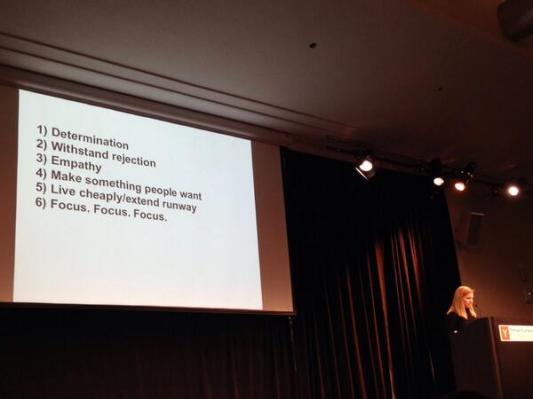Y Combinator held its first ever Female Founders Conference Saturday afternoon at the Computer History Museum in Mountain View, California. In opening remarks, Y Combinator co-founder Jessica Livingston said that the sold-out gathering is “the most over-subscribed event” in the famed startup accelerator’s history.
For an organization whose biannual Demo Days have become known as one of the hottest tickets in Silicon Valley, that is no small feat — and it could signal a sea change in the entrepreneurial landscape.
“Because YC invests so early and is so focused on funding outliers, we tend to see trends first. So when we see that 25 percent of startups in the current Y Combinator batch have female founders, I’m certain something is going on here,” Livingston said. “In any big change there’s always a moment when people think it is a tipping point. I wouldn’t be surprised if in five years, we feel like 2014 was the tipping point for female founders.”
Livingston kicked off the event by sharing basic advice that she likes to share with all startup founders, such as the importance of having determination, empathy, focus, and thriftiness (the bullet points are in the image above, via an image shared by Twitter user Becky Cruze.) She then entered into more personal territory, sharing more targeted advice specifically for female founders.
“I thought about what advice I’d give to my sister if she were starting a startup,” Livingston said, adding that she had had second thoughts about sharing gender-specific advice in a public forum. “Things can get pretty heated out there on the Internet on the topic of women and tech, and I really agonized about what to do…. but I’m going to risk it and speak candidly.”
Here are the three key pieces of advice Livingston shared for female founders:
Having children and starting a business is hard — but possible.
“Based on my own experience, I’d say it’s easier to start a startup before you have kids,” Livingston, who has two sons aged five and two, said. “In the first few years of YC [which was founded in 2005], when I did everything, I was working really long hours, seven days a week, and it was all-consuming. I don’t know if I could have done that with kids.”
She added, however, that many successful male and female founders start businesses with young kids at home. “It’s definitely possible to combine kids and doing a startup,” she said. “Y Combinator has funded women and men with kids of all ages, including newborns, and we’ll continue to do so. …But if you do have kids and start a startup, know what you are up against” and don’t be afraid to seek help. That may mean outsourcing tasks that aren’t directly related to your business or your home life, such as grocery shopping, she said.
It’s OK to be the ‘quiet cofounder’
“I’m by nature a bit shy, and I don’t like the idea of being a public figure… I’ve never needed public acknowledgement of my contributions to YC,” Livingston said. “But while I may be quiet publicly, I’m quietly determined. And it’s OK to be like that. Don’t feel like you have to change who you are, as long as you get stuff done.”
This advice is especially pertinent to female founders due to the nature of how women are often raised, Livingston said. “I’m not an aggressive person, and often, girls aren’t trained to be aggressive in the same way that boys are.”
One downside is that quiet founders “will be ignored by people who can only hear loud voices.” But if he or she is prepared to be occasionally overlooked, the final result can be a successful one. “Quietly determined people beat out people who talk loudly but never do anything.”
Learn how to code — and don’t be afraid to make your startup personal
As the non-technical female co-founder of Y Combinator, Livingston’s last bit of advice was directed to the non-programmers in the room who were starting companies. “Learn to program yourself. That is the best advice I could give to anyone non-technical,” she said. In addition, she said, non-technical founders should surround themselves socially with programmers.
And if your social and work lives blend together, that’s OK. Livingston, who is herself married to her Y Combinator co-founder Paul Graham, said that founders should not shy away from starting a business with a significant other or spouse. Fully 34.5 percent of the female founders who have launched companies out of Y Combinator have had significant others as co-founders, she said. “Don’t feel like there’s anything weird about starting a startup with your significant other. We have significant evidence it works.”
Feature image of Jessica Livingston at the Female Founders conference via Becky Cruze’s Twitter account
